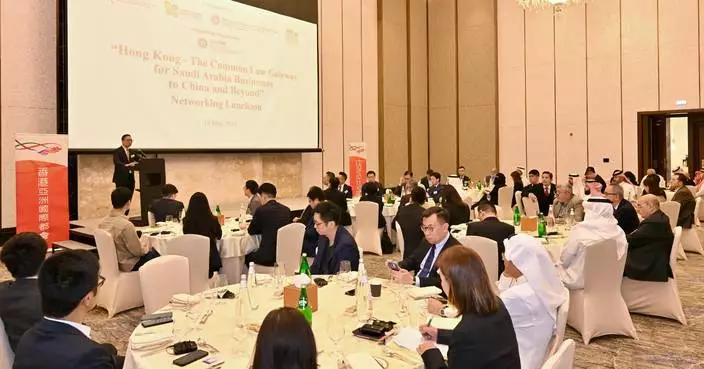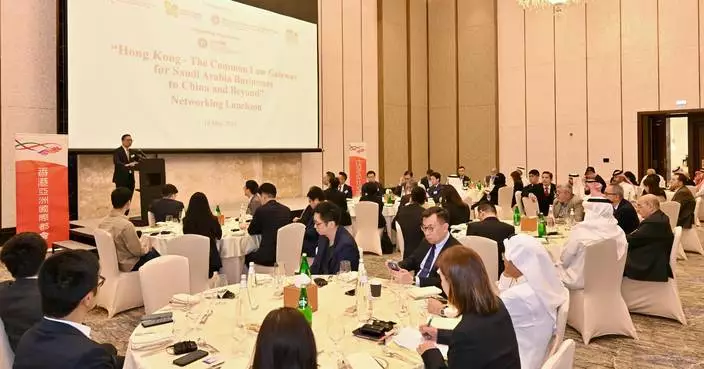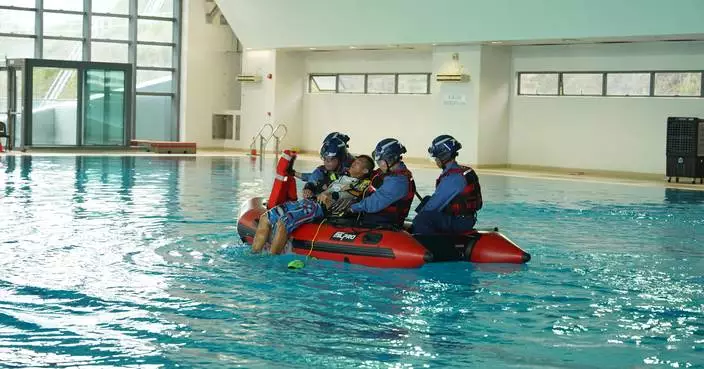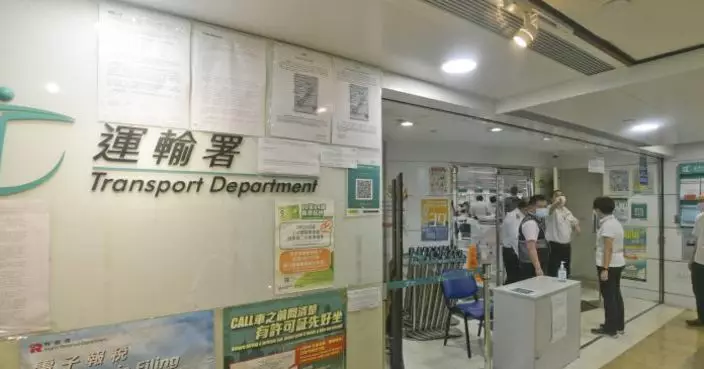Cracking the code on styrofoam waste: how to manage it effectively
Following is a question by the Hon Lam So-wai and a written reply by the Secretary for Environment and Ecology, Mr Tse Chin-wan, in the Legislative Council today (May 8):
Question:
Regarding the handling of styrofoam waste, will the Government inform this Council:
(1) of the current daily amount of styrofoam waste being sent to landfills;
(2) as it is learnt that styrofoam is widely used as a packaging material for some household electrical appliances (e.g. air-conditioners, refrigerators, washing machines and televisions), whether the Government has compiled statistics on the amount of styrofoam waste generated from the packaging materials of household electrical appliances in each of the past three years and, among such waste, the amount that was sent to landfills;
(3) as there are views that the economic benefits of styrofoam recycling are relatively low, how the Government assists the recycling industry in handling large volumes of styrofoam waste when alternatives that can completely replace styrofoam have not yet emerged;
(4) whether it has assessed if the problem of styrofoam waste can be fully resolved when I·PARK1, a modern waste-to-energy incinerator for treating municipal solid waste, becomes operational in 2025; and
(5) whether the Government currently has plans to fully resolve the problem of styrofoam waste?
Reply:
President,
Given styrofoam being lightweight but bulky in volume, even when a large amount of styrofoam is recovered and processed, only a small amount of raw plastics will be produced. The costs on transportation and recycling are high. Coupled with the fact that most of the waste styrofoam is either contaminated or mixed with impurities, the recycling efficiency of styrofoam is comparatively low. Hence, the Government has put forward various strategies on handling styrofoam waste: (i) reducing use at source, such as banning the sale or supply of styrofoam tableware, and encouraging electrical appliances suppliers to reduce the use of styrofoam packaging materials; (ii) encouraging reuse, such as styrofoam boxes used for storage of vegetables and fruits; and (iii) providing outlets for recycling, such as recycling of styrofoam products at the GREEN@COMMUNITY facilities. As regards styrofoam that cannot be reused or recycled, to reduce the amount of such waste to be transferred to landfills for handling, the Government is constructing the Integrated Waste Management Facilities Phase 1 (I·PARK1), with a view to transforming waste into energy with advanced technology.
The consolidated reply to various parts of the question raised by the Hon Lam So-wai is as follows:
The Environmental Protection Department (EPD) has not compiled the breakdown of statistics on the quantity of waste styrofoam generated and disposed of.
As mentioned in the Government's overall strategies in the preamble, in respect of styrofoam tableware, the Government has implemented the new regulation on disposable plastic tableware and other plastic products on April 22 this year. Restaurants and retail stores are not allowed to sell or supply all styrofoam tableware (including plates, food containers and cups), thereby directly and significantly reducing the use of styrofoam at source.
In respect of packaging materials for household electrical appliances, the EPD conducted a survey on packaging materials for the trade of electrical and electronic appliances suppliers in 2022 and encouraged them to reduce the amount of styrofoam packaging materials as much as possible. Among the replies from electrical appliances suppliers, more than 50 respondents (about 60 per cent) stated that they had actively reduced the use of styrofoam in the packaging of electrical and electronic products, and, when practicable, even ceased using styrofoam altogether. According to the responses of these electrical appliances suppliers, the use of styrofoam for packaging in most of their small household appliances have been reduced or ceased. To commend companies with outstanding performance, the EPD presented awards to several electrical and electronic appliances suppliers who have reduced the use of styrofoam packaging in at least 60 per cent of their products, including Gilman Group Limited, Arçelik Hitachi Home Appliances Sales Hong Kong Limited, Shun Hing Electric Works and Engineering Company Limited, Midea Electric (Hong Kong) Limited and German Pool (Hong Kong) Limited, at the opening ceremony of the "GREEN@COMMUNITY Recycling Month" in November 2022. Through this event, we had also appealed to more suppliers of different products to reduce the use of packaging material (including styrofoam). In addition, the EPD published the "Practical Guides on Packaging Reduction and Management" (Guides) for the electrical and electronic appliances sector on May 2 this year and issued letters to electrical appliances suppliers to encourage them to make reference to the Guides and use recyclable packaging materials in place of styrofoam.
To facilitate different sectors in kick-starting their journey on packaging reduction and management, apart from the electrical and electronic appliances sector, the EPD is also developing a set of Guides for specific sectors to provide practical tips and experience sharing on how to avoid and reduce packaging consumption (including styrofoam containers) so as to achieve sustainable packaging management in their daily operations. For details about the Guides, please visit the following website:
www.wastereduction.gov.hk/en-hk/resources-centre/packaging-reduction-tips-different-sectors.
In respect of styrofoam boxes used for vegetables and fruits, those used for transporting vegetables and fruits supplied to Hong Kong from the Mainland are mainly returned to the Mainland for reuse. With the resumption of normal travel between the Mainland and Hong Kong since January 2023, the arrangement has been running smoothly. In addition, the Food and Environmental Hygiene Department, the Agriculture, Fisheries and Conservation Department, and the Fish Marketing Organisation have installed cold-press machines in the overhauled markets and wholesale markets respectively and arranged local recyclers to recover and recycle styrofoam boxes that cannot be reused due to damage or other reasons on the spot.
From the perspective of environmental benefits, reusing styrofoam boxes is better than recycling. However, styrofoam also has unfavourable characteristics, such as poor strength, brittleness and low degradability. Balancing the cost-effectiveness and the long-term development of the industries, we will continue to maintain dialogue with the food and recycling industries, encourage the food industry to switch to stackable, durable and easy-to-clean plastic boxes for transportation of goods in the long-run as far as practicable.
In terms of recycling styrofoam, all GREEN@COMMUNITY facilities accept styrofoam items generated from households for passing on to downstream recyclers approved by the EPD for proper treatment and turning them into resources. Each Recycling Stations and Recycling Stores under GREEN@COMMUNTIY has a workshop for temporary storage of recyclables. If members of the public need to hand over styrofoam that is relatively bulky in size to GREEN@COMMUNITY, they are advised to contact the relevant facility to make prior arrangements.
Meanwhile, the EPD is working at full steam on constructing I·PARK1 near Shek Kwu Chau, which is the first modern waste-to-energy incineration project in Hong Kong, with an expected handling capacity of 3 000 tonnes of municipal solid waste (MSW) per day. I·PARK1 will mainly receive MSW, including styrofoam waste, transported by sea from the West Kowloon Transfer Station and turn the waste into energy.

Source: AI-generated images
Unlocking opportunities: how hong kong's common law can propel saudi businesses into the chinese market and beyond
Following is the speech by the Secretary for Justice, Mr Paul Lam, SC, at the lunch and networking reception titled "Hong Kong - The Common Law Gateway for Saudi Arabia Businesses to China and Beyond" in Riyadh, Saudi Arabia, today (May 19, Riyadh time):
Distinguished guests, ladies and gentlemen,
Firstly I would like to express my gratitude and to welcome all of you to this networking luncheon organised by the Department of Justice together with other organisations as the MC has just said. I wish just to take the opportunity to say a few things to explain why we are here and what we need to achieve. But let me begin by making one very important point: today's lunch has a very special meaning to me and to my delegation from Hong Kong because there are many "firsts".
This is the first time I lead a delegation consisting of lawyers and members from other business sectors on an overseas trip after I became the Secretary for Justice in July 2022. This is the first "first". The second "first" is that as to this particular trip to the Middle East, Saudi Arabia is our first destination. So that our first destination is the second "first". The third "first" is that we just arrived this morning around 3am, some arrived a little later at 4am or 5am. And this particular lunch is in fact the first event for the whole trip including that in Saudi Arabia. So it is going to be very memorable. As there is a Chinese saying, because we have a lot of friends coming from the Mainland China, a good beginning means 50 per cent of your success. So I am truly very honoured and very pleased to see so many guests from Saudi Arabia and also representatives of enterprises, organisations from Mainland China in Saudi Arabia and to come here to join this lunch.
Now coming to the purpose of this lunch, and perhaps this trip. Obviously, as the minister of justice of Hong Kong, I am trying to tell you a little bit more about the legal service in Hong Kong, what we can offer, but, more importantly, we have to start by making friends. We have to start by building personal relationship. In order to build a personal relationship, the very first thing we need to do is to introduce ourselves.
My delegation consists of, I don't remember the exact number, but probably maybe around 40 including all my supporting staff. Now the combination is quite unique. Firstly, we have people coming from the Government, not just from the Department of Justice in which I am working, I am joined by representatives of Invest Hong Kong which is a branch of the Government responsible for promoting investment, colleagues coming from the ETO (Hong Kong Economic and Trade Office) all the way from Dubai, for they are responsible for promoting trade around the world. And then we have representatives from the Hong Kong Trade Development Council which is a statutory body also responsible for promoting trade. So we have numerous organisations trying to work together to enhance Hong Kong's relationship with other jurisdictions.
Apart from representatives coming from the Government, we have very strong representatives from the private sector. We have more than around say 15 lawyers who are really the top lawyers in Hong Kong. They specialise in doing both contentious and also non-contention business. We have experts doing IPOs (initial public offerings), M&A (mergers and acquisitions), and we also have experts in arbitration or litigation. So we have whole spectrum of legal eagles in this room. And on top of that, I have also invited representatives from the Hong Kong Stock Exchange and Hong Kong International Arbitration Centre to be here.
Now you may wonder why instead of simply asking my colleagues to come here, which is much easier to organise this trip, why I have invited so many friends to come here. The reason is very simple, because I wish to demonstrate to people, our friends in Saudi Arabia, that Hong Kong is really an ideal place to provide one-stop professional legal service from the time you think of setting up a business in Hong Kong for exploring opportunities in Mainland China, up to the very end when unfortunately some disputes arise, and then you have to consider where and how to resolve the disputes. We offer a sort of packaged professional services from the very beginning until the very end. And the representatives of this delegation, they are experts at different stages of these whole business cycle, so to speak.
Now, maybe you have noticed that we have a theme for the talk, and in fact, that is also the theme I am going to use throughout my trip. It goes something like "Hong Kong - The Common Law Gateway for Saudi Arabia Businesses to China and Beyond". I think "gateway" simply symbolised the fact that Hong Kong is playing a very important role of connecting Saudi Arabia and the Middle East with not just Hong Kong itself. Hong Kong is not just a destination, it is also a springboard or place that can take you to other parts of China so that you can explore opportunities in the whole country.
Now, what is perhaps a little bit unusual is that I have deliberately add the word "common law" before the word "gateway". And here comes the important point, because as the person responsible for promoting legal services in Hong Kong, this is really the point that I wish to emphasise at this lunch. Now, why is this so important? Why is it of interest to friends in Saudi Arabia?
To answer the question, perhaps I have to step back and talk a little bit about the history of Hong Kong. I am sure most of you would be aware of what I am going to say, but it is worth repeating now. I am sure that those of you would be aware of the fact that Hong Kong used to be ruled by the British for more than 100 years between 1842 until June 30, 1997. Now, the important thing is that during this period of British rule, the British introduced the common law system to Hong Kong and that common law system developing for a century has become extremely reputable and well-established. And what happened on July 1, 1997 is that China resumed sovereignty of Hong Kong. China decided to resume sovereignty in a very unique manner which was unprecedented in human history, that is by introducing the concept or principle of "one country, two systems", which means that Hong Kong shall maintain and preserve its common law system. So we are still using the common law system in Hong Kong, which is entirely different from the civil law system used in other parts of China.
You may then ask: why is the common law system so significant? How is it relevant to your business or investment interests? Now, I wish to highlight four important characteristics perhaps we ought to bear in mind.
The first characteristic that I wish to stress is that we have a very trustworthy, very credible, very reliable and reputable judicial system. Under the mini-constitution of Hong Kong, which is called the Basic Law of Hong Kong, the courts of Hong Kong enjoy independent power of adjudication, including the Court of Final Appeal in the power of final adjudication. That means in every litigation of court proceedings in Hong Kong, it always ends in Hong Kong, it never goes beyond Hong Kong.
And a very special feature that is also worth mentioning is that in our Court of Final Appeal, which is the highest court in Hong Kong, we have invited at the moment 10 overseas judges, very eminent retired judges from other jurisdictions, to sit as our part time judges. A very recent appointment is a retired federal judge from Australia. We also have retired judges from England, from Australia, from Canada. Before their retirement, they used to be the chief justice of their respective jurisdiction. And I think that firstly it is a vote of confidence of judges from other jurisdictions in the legal system of Hong Kong. And secondly, it is a symbol and the indication of the quality of justice that the Hong Kong judicial system can offer. So this is my first point.
The second point is that the Hong Kong legal system offers a very secure and safe regulatory system to safeguard your financial interests. Under our Basic Law, which a constitutional document, we guarantee private property right. So no one can expropriate your property, not even the government under no circumstances can they take away your property at their own discretion. And then free flow of capital is guaranteed. Money can come in Hong Kong and leave Hong Kong freely. So it is a very, very friendly environment for funds to move in and to move out. But at the same time, we also have a very strict regulatory framework to ensure that misconduct or malpractices will not be permitted. So this is to strike a balance to ensure free flow of capital and at the same time to ensure that your money, your investments and financial interests will be sufficiently protected.
The other thing is that when it comes to law enforcement, Hong Kong is regarded as one of the cleanest place in Hong Kong. So corruption or other sort of malpractice that might exist in some other places in the world is not an issue in Hong Kong. So putting aside a similar framework in practice, it's applied and enforced very straightly and properly.
So then go to my third point. My third point is that our legal system is extremely business friendly. Business friendly in the sense that the content of our law is extremely similar to the civil and commercial law that we found in most other countries, in particular in the western world, say the United States and the UK and western Europe. And the simple reason is because of the common law tradition that I have mentioned. Most of our civil and commercial law, for example company law and contract law, the content is almost identical to what you may have in England, Australia and New Zealand. So the important thing is that our set of law is extremely familiar to the international business community. But at the same time, apart from maintaining our tradition, we try to ensure that our law will be updated to meet the new demands. So very recently we have introduced a new legislation to encourage people to set up, for example, family office in Hong Kong by providing tax advantages. And there are also other measures to ensure that we can provide a very attractive environment at the same time to give you the sort of protection that you deserve. Ms Alpha Lau, the Director-General of Invest Hong Kong, is going to speak after me. I am sure that she can provide more details in this respect.
But apart from the substantive law, what is equally important is that we have a very strong pool of legal talent in Hong Kong. I mentioned earlier that more than 15 lawyers come with me and that by itself is an evidence on the strength of the legal profession. We have a divided legal profession in Hong Kong consisting of barristers and solicitors. Barristers are specialists in doing contentious business. They go to court most of the time, they also take part in arbitration and mediation. And then the solicitors, they are more general in practice. They will be responsible for non-contentious matters, say M&A, IPO, providing advisory work, so on and so forth. So what I wish to emphasise is that we have a big pool of top-quality professionals who stand ready to serve your interests. And one thing that we must bear in mind is that most of these legal professionals are bilingual, many of us are Chinese, of course we have a lot of expatriates. Because of the unique situation in Hong Kong, apart from being very familiar with the international legal community, we are also extremely familiar with how things are done in Mainland China, both the culture and the business environment. So I think that is also an advantage that would work in your interests.
Now the fourth point that I would like to mention about our legal system is that it provides very close connection to both Mainland China and other parts of the world. Now firstly, in particular, I would like to speak on how Hong Kong's legal system is connected to the Mainland because this is a feature that cannot be copied or found elsewhere. I said earlier on that under the principle of "one country, two systems", Hong Kong's legal system is different or separate from that of the Mainland, but it doesn't mean that there is no connection between the two legal systems within the same country. Quite the contrary, we have at the moment nine mutual legal assistance arrangements that connect the two jurisdictions together. And these connections, based on the mutual legal assistance agreements are of great significance to safeguard the interest of investors and businessmen from overseas. I can give you a very simple example. Based on some of the arrangements that I mentioned, a court judgment in Hong Kong for an arbitral award in Hong Kong can be recognised and enforced in the Mainland. So if your business partner is in Mainland China, your assets there that you have to protect, but you wish to take advantage of Hong Kong legal system because you have confidence in our legal system, then Hong Kong is the right choice. You can use our legal system, but you can enjoy the fruit of success of the legal process in Mainland China. Now these legal arrangements are unique to Hong Kong. It is only made possible because of the "one country, two systems" arrangement. So if you go to places like, just as an example Singapore or other places, then you will not find exactly this same sort of co-operation, arrangement or convenience.
So putting these four characteristics together, I would have thought that you will be convinced to a certain degree that Hong Kong is definitely a place for you to consider to act as a platform, a connector, a springboard for you to go into the market in Mainland China and beyond. I said "beyond" because we are all aware of the development and relationship between Middle East and China, including in particular the relationship between Saudi Arabia and China. We have very long friendship going back for more than 1 000 years. Of course I am referring to the Silk Road. But I note that in June 2023, last year, your investment minister said in a very important conference that there would be a modern silk road between Arab countries, including of course, Saudi Arabia, and China. So "silk road" is not something belonging to history. It is not about the past. It is also about our common future. So Hong Kong plays a very significant role in fostering a better relationship between the two countries because of the unique characteristics offered by "one country, two systems".
And as you may note, last February the Chief Executive of Hong Kong came here with a strong delegation, I remember it's almost 100 persons from different sectors. A lot of agreements have been signed, and a lot of initiatives. And after that, many colleagues from the Government in different areas have come to Saudi Arabia. So it is now my turn, basically. And we are talking about setting up an ETO, economic and trade office, in Saudi Arabia in Riyadh. I hope it will come into reality soon. But the future is very clear, the direction is very clear. I am very confident and I hope that you are equally confident that the relationship between Saudi Arabia and Hong Kong is going to be very strong and much closer than today. But it requires some efforts. So I am sure that each and every one of us in this room can make some contributions to make what we have in mind to come true as soon as possible. It is a bit a pity that we only have about two hours or so at this lunch to make friends, to talk about things of common interests. It may be a very small step in the overall scheme of things, but I do believe that this is the small step that will take us closer to our final destination.
So lastly, I wish you all a very enjoyable lunch. I hope we can make some friends and enhance our relationship. If you have any question on Hong Kong, I am sure that my friends from Hong Kong sitting at the table will be more than happy to entertain all the questions. And I am very confident that they will have good answers. And obviously, we are also very interested to hear from you about your situation in Saudi Arabia. I think to make friends, we have to know each other first. So thank you very much.

Speech by SJ at lunch and networking reception titled "Hong Kong - The Common Law Gateway for Saudi Arabia Businesses to China and Beyond" in Riyadh, Saudi Arabia Source: HKSAR Government Press Releases










